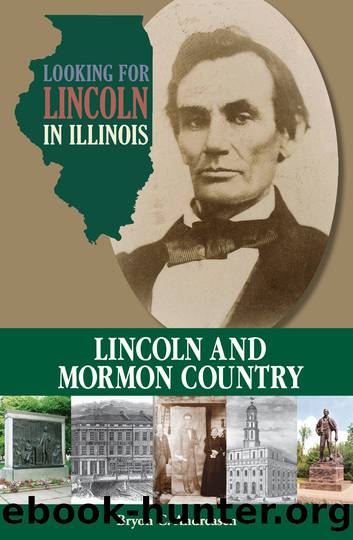Looking for Lincoln in Illinois by Andreasen Bryon C.;Fraker Guy C.;

Author:Andreasen, Bryon C.;Fraker, Guy C.; [Andreasen, Bryon C.]
Language: eng
Format: epub
Publisher: Southern Illinois University Press
5. THE BATTLE OF NAUVOO
ABRAHAM LINCOLN WAS SEVERAL COUNTIES AWAY attending court at Tremont when an army of anti-Mormon extremists besieged Nauvoo. Their initial commander was James W. Singleton, a Whig lawyer and aspiring politician from Brown County. Singletonâs objective had been to enforce an arrest warrant. But when he realized that the warrant was merely a pretext for attacking Nauvoo, he sought a peaceful resolution. His militiamen refused. They also refused to obey state officials sent by Governor Thomas Ford to prevent violence. Singleton resigned command rather than be party to an unauthorized attack on civilians. Two years previous to what became known as the Battle of Nauvoo, Singleton commanded state troops that accompanied Governor Ford to Nauvoo, where Ford spoke at the very moment Joseph and Hyrum Smith were murdered in Carthage, Illinois, in 1844. The following yearâ1845âSingleton played an important role at a regional meeting in Carthage that demanded all Latter-day Saints leave Illinois.
JAMES W. SINGLETON BEGAN HIS political career as a Lincoln ally. In the years after the âMormon War,â however, the two men drifted apart. When the Whig Party disintegrated in the mid-1850s Singleton became a Democrat rather than follow Lincoln into the antislavery Republican Party. During the Civil War Singleton was a prominent âCopperheadââa severe critic of Lincoln, emancipation, and the war. Lincoln told his secretary John Hay that Singleton was âa miracle of meanness.â Nevertheless, near the end of the war Lincoln permitted Singleton to engage in speculative cotton and tobacco trading across enemy lines. Singleton reported performing a peace mission for Lincoln by meeting with Confederate leaders in Richmond. He claimed that Lincoln was willing to make peace without insisting on the abolition of slaveryâunfairly casting a shadow on the Presidentâs reputation.
Download
This site does not store any files on its server. We only index and link to content provided by other sites. Please contact the content providers to delete copyright contents if any and email us, we'll remove relevant links or contents immediately.
| Afghan & Iraq Wars | American Civil War |
| American Revolution | Vietnam War |
| World War I | World War II |
Waking Up in Heaven: A True Story of Brokenness, Heaven, and Life Again by McVea Crystal & Tresniowski Alex(37020)
Empire of the Sikhs by Patwant Singh(22188)
We're Going to Need More Wine by Gabrielle Union(18088)
Hans Sturm: A Soldier's Odyssey on the Eastern Front by Gordon Williamson(16829)
Leonardo da Vinci by Walter Isaacson(11926)
The Radium Girls by Kate Moore(10922)
Educated by Tara Westover(7084)
Tools of Titans by Timothy Ferriss(6970)
How to Be a Bawse: A Guide to Conquering Life by Lilly Singh(6705)
The Last Black Unicorn by Tiffany Haddish(5085)
Permanent Record by Edward Snowden(5009)
The Rise and Fall of Senator Joe McCarthy by James Cross Giblin(4853)
Promise Me, Dad by Joe Biden(4459)
The Wind in My Hair by Masih Alinejad(4428)
The Crown by Robert Lacey(4117)
A Higher Loyalty: Truth, Lies, and Leadership by James Comey(4043)
The Iron Duke by The Iron Duke(3654)
Joan of Arc by Mary Gordon(3272)
How to be Champion: My Autobiography by Sarah Millican(3196)
